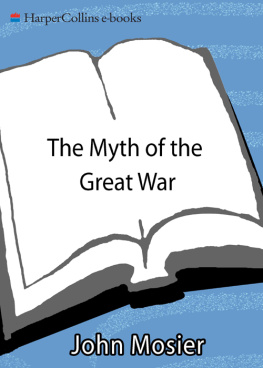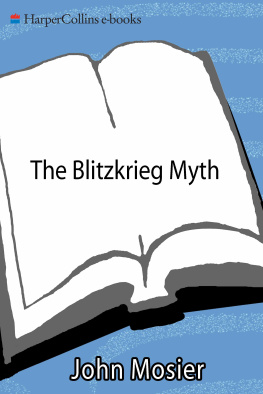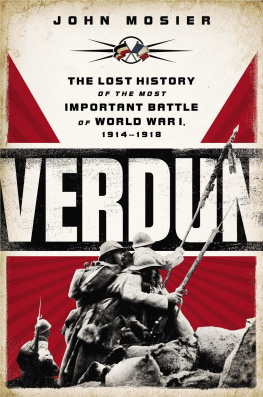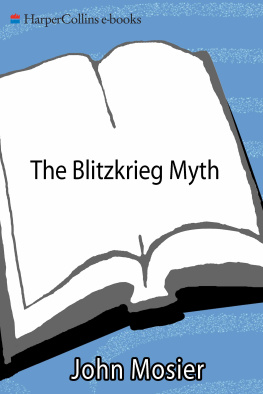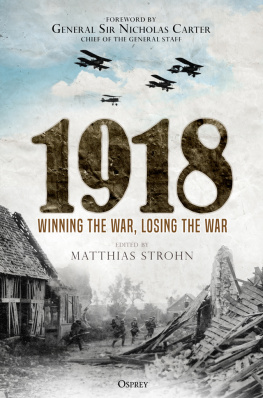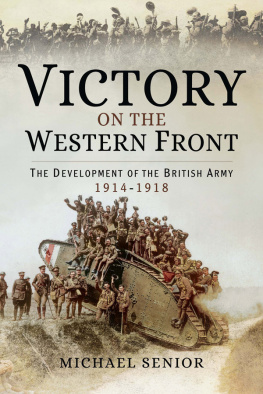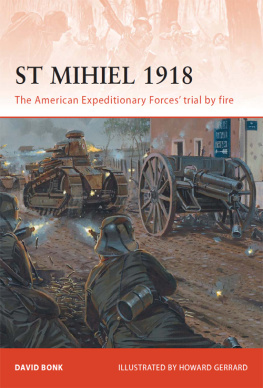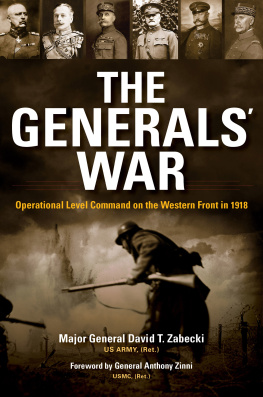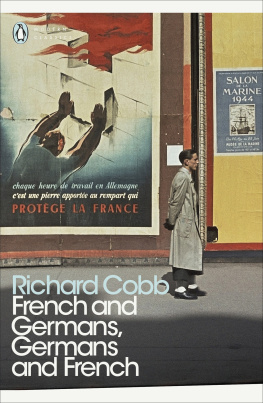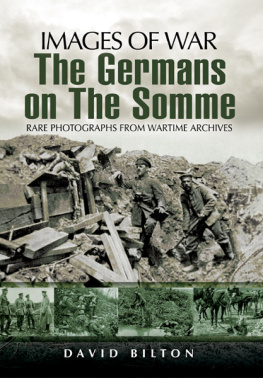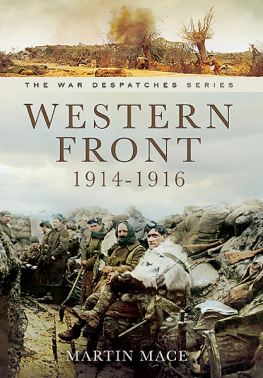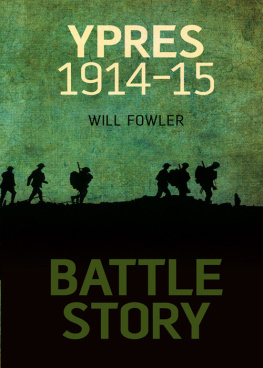THE MYTH
OF THE
GREAT WAR

A NEW MILITARY HISTORY OF WORLD WAR I
John Mosier

Contents
F or American readers the First World War is a distant and faded memory. Given the number of histories dealing with the war that have appeared in Great Britain in recent years, this is clearly not the case for the English reader, who as a result perhaps has certain expectations about what such a history should cover. On picking this volume up, and seeing it has little to say about the Eastern Front, and nothing at all to say about the fighting in Africa or Asia Minor, or the war at the sea, the reader may conclude that it is hardly fair to call this a story of the Great War.
In truth, however, every history of this war excludes a great deal. No British or American account deals adequately with the war between France and Germany on the Western Front. So to the reader who feels the book is incomplete because it omits an account of, say, Gallipoli, I would reply that this tragic adventure had much less of an impact on the course of the war than did the Battle of Wovre Plain in the spring of 1915. I also think that reader who reflects on that part of this book that does deal with military operations in the East will realize that Allied hopes that such operations would bring about a decisive end to the war were entirely delusionary.
No history of the war is complete; mine at least has the merit of relating a part of it which is mostly new. If would be foolishly pretentious of me or of any historian to lay claim to some profoundly original or novel insight into the war. What I do claim is this. This history reveals to the interested reader a great deal that has been ignored or supressed by other historians, and it demonstrates connections that have either been ignored or denied. Moreover, while much of it may be well known to a handful of specialists, their insights have not filtered down either to the general reader or even to the standard accounts.
Claims about the German and French casualties sustained during the Battle of Verdun, for example, continue to be wildly misreported, even in the works of specialists, although extremely accurate estimates have been available since immediately after the war. Accordingly there is much here that the thoughtful reader will find surprising.
It may fairly be said that this narrative is more concerned with the events of the first half of the war than the second. There is a reason. The patterns of combat were established early on, and they remained surprisingly constant throughout the war. The Allied tendency to attack the strongest parts of the German line in almost suicidal fashion began in 1914 and was still a feature of late 1917. So too with the surpriseand surprisingly successfulGerman offensives, the last of which was in the summer of 1918.
This is not to suggest that there was no change, no improvement, no tactical development. The Allied armies of 1918 were far better than the armies of 1914. Unfortunately the Germans, who had begun the war with better equipment and better tactics, improved as well.
Readers will discover as they near the end of the book that the intervention of the United States in the war looms large. This is not American chauvinism, because, as I say in the introductory chapter, I had always assumed that the contribution of the United States to winning the war was more on the order of Canadas, and I was quite astonished by what my research uncovered. My aim in writing this book was to introduce the reader to a largely unknown side of the war, to explain how it was that the Germans were almost invariably victorious on the battlefield, and to show how the Allies consistently misrepresented what was happening.
However, as I worked, I found that part of the misrepresentation involved grossly underestimating the impact that the United States had on the war. For American historians, the neutrality of the United States until it was reluctantly forced into the war is virtually a holy writ. Consequently there has been a certain coyness about the extent to which American finance and American industry supported the Allies long before the formal declaration of war.
On the other side of the Atlantic, there has been an equal reluctance to admit the extent to which American intervention in 1918 was decisive. For many analysts, the idea that the BEF broke the back of the German Army in summer and fall of 1918 is the only illusion about the war left to them, and I suspect it is one that will be clung to fiercely. In fact the AEF was much more successful than is commonly allowed, even, or particularly, by American historians. The concluding chapters of the book address those achievements. The great war monuments of the British Empire and of France are ossuaries and memorials to the dead. The great American monuments in France are victory columns.
History is not amenable to controlled testing. Consequently we have no way of knowing if the United States actually won the war for the Allies. My own contention is more modest: without those millions of pounds sterling, those millions of tons of high explosives, and those two million American soldiers, the Allies would have lost the war. But such arguments trouble me because they obscure a more fundamental issue. In this war there were no real victors. If the United States intended to impose a new world order on Europe, it failed abysmally. If France and Great Britain intended to create a new balance of power, they failed as well. That they certainly failed to destroy Germany as a great power is a fact so painfully obvious it hardly bears mention.
The narrator of Ford Madox Fords brilliant novel The Good Soldier (first published in 1915) begins his narrative by opining that the story he is about to tell is the saddest he has ever heard. He was wrong. The story of the Great War is the saddest story ever heard. He who tells it differently does no service to the memory of the millions of soldiers whose remains lie in France and Belgium. As a young French soldier wrote in April of 1915:
Whosoever curses not war shall be cursed! Amen. By the blood and by the braise; by the cries of terror and agony with which the darkness shivers; by the freezing wind of the shell which makes the hairs stand up and the horrible flame which scorches them; but the hairs which dry on the face of the dead shall be cursed.
In a book that was eleven years in the writing, and even more years in the thinking, the number of people whose contributions should be acknowledged becomes so great it is impossible to list them all.
I owe a profound intellectual debt to three people in particular, the spiritual godparents of this book. I learned about diplomatic affairs of the times from David Amacker (formerly a lieutenant in the U.S. Army), one of President Wilsons interpreters at Versailles. Frank Byerley, Jr. (formerly a captain in the U.S. Army), a Ploneer aviator, was one of the countrys first autogyro pilots, and probably the only aviator ever to be grounded by the president of the United States. It is to him that I owe my knowledge of all things mechanical. I was introduced to France by Vera Volmane, who was at the time president of the French Film and Television Critics Association. Getting to know Vera, a formidable film critic and an outspoken journalist, was getting to know France, with all its strengths and weaknesses.
Any teacher owes a great deal to his colleagues, and I was fortunate to work with two men, both fine scholars, who encouraged me to teach and write about military affairs; C. Joseph Pusateri, a talented historian, and Richard Frank, a brilliant young teacher of German.
Next page
